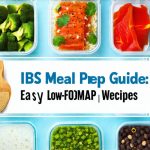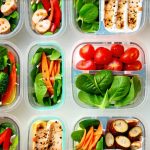Living with Irritable Bowel Syndrome (IBS) often means navigating a minefield of dietary restrictions and unpredictable symptoms. Many find that careful meal planning is essential not only for managing their condition but also for reducing stress around food. The constant worry about triggering flare-ups can be exhausting, making simple pleasures like eating out or grabbing a quick lunch incredibly challenging. This is where the power of prepping IBS-friendly meals in advance comes into play. It allows you to control ingredients, portion sizes, and cooking methods, ultimately giving you back control over your digestive health and peace of mind.
Prepping isn’t about spending hours in the kitchen every week – it’s about strategically planning and preparing components that can be easily assembled into full meals throughout the week. It’s a proactive approach to wellness, empowering you to nourish your body without fear. This article will guide you through practical strategies for prepping IBS-friendly meals, offering tips on ingredient selection, batch cooking techniques, and storage solutions.
Understanding Your Triggers & Building a Base
The foundation of successful meal prepping for IBS lies in knowing your personal triggers. What sets one person’s IBS off might not bother another, making individualized planning crucial. Common culprits include FODMAPs (fermentable oligosaccharides, disaccharides, monosaccharides and polyols), gluten, caffeine, alcohol, spicy foods, and dairy. Keeping a food diary for a few weeks can help identify patterns between what you eat and how you feel. This isn’t about eliminating entire food groups unnecessarily; it’s about understanding your limits and making informed choices.
Once you have a better grasp of your triggers, you can start building a base of safe foods to incorporate into your meal prep routine. Think lean proteins like chicken or fish, easily digestible carbohydrates such as white rice or quinoa (in moderation), and low-FODMAP vegetables like carrots, spinach, and zucchini. Don’t shy away from herbs and spices – they add flavor without triggering symptoms for most people. Remember that portion control is also key; even safe foods can cause problems if consumed in excessive amounts.
Planning your meals around these core ingredients ensures you have a reliable starting point for each week’s prepping session. It reduces the chance of impulse decisions based on cravings and increases the likelihood of sticking to an IBS-friendly diet. Consider utilizing online resources that list low-FODMAP foods, but always prioritize what you know works best for your body.
Batch Cooking & Smart Storage Solutions
Batch cooking is the heart of efficient meal prepping. Instead of preparing individual meals each day, you dedicate a few hours to cook larger quantities of base ingredients or complete dishes that can be portioned out and stored for later use. This significantly reduces time spent in the kitchen during busy weekdays and minimizes stress around mealtimes.
Start small – don’t feel pressured to prep an entire week’s worth of meals at once. Begin with one or two components, like cooked quinoa and roasted vegetables. As you become more comfortable, gradually increase the amount you prepare. For example, roast a large tray of chicken breasts seasoned with ginger and turmeric (both generally well-tolerated by IBS sufferers), then portion them into containers for use in salads, stir-fries, or wraps. Similarly, cook a big batch of white rice and freeze portions to quickly add to meals.
Proper storage is crucial to maintain freshness and prevent spoilage. Invest in airtight containers – glass or BPA-free plastic are good options. Label each container with the date it was prepared to keep track of how long it’s been stored. Generally, cooked food should be consumed within 3-4 days if refrigerated, or frozen for longer storage (up to 2-3 months).
Utilizing Freezer Power for Maximum Convenience
The freezer is your best friend when it comes to meal prepping! Not only can you freeze pre-portioned meals for quick and easy dinners, but you can also freeze individual ingredients. For instance, if you find yourself with an abundance of spinach, blanch it briefly in boiling water, then plunge it into ice water before freezing – this helps preserve its color and nutrients. Similarly, cooked grains like quinoa or rice freeze exceptionally well.
When thawing frozen meals, allow them to defrost completely in the refrigerator overnight. Avoid using the microwave for thawing, as uneven heating can create pockets where bacteria may grow. Reheat thawed food thoroughly before consuming. Remember to always check if an ingredient freezes well before prepping a large batch – some vegetables can become mushy or lose their texture when frozen.
Beyond the Main Course: Prepping Snacks & Breakfasts
Don’t limit your meal prep to just lunches and dinners! Preparing IBS-friendly snacks and breakfasts in advance can be equally beneficial. Think about making a batch of oat bars using gluten-free oats, low-FODMAP fruits like blueberries, and a touch of maple syrup. You could also portion out individual servings of Greek yogurt (if tolerated) with berries or prepare overnight oats made with lactose-free milk or almond milk.
For breakfasts, consider pre-making smoothie packs containing frozen banana slices, spinach, and a scoop of protein powder. All you need to do in the morning is blend them with liquid for a quick and nutritious start to your day. Having these readily available options prevents impulsive snacking on trigger foods when hunger strikes.
Final Thoughts on Sustainable Prepping
Meal prepping for IBS isn’t a one-size-fits-all solution, but it’s an incredibly empowering tool for managing symptoms and improving overall well-being. It requires experimentation, patience, and a willingness to adapt your approach based on your individual needs. Start small, focus on understanding your triggers, and gradually build up your prepping skills over time.
The key is to create a system that fits seamlessly into your lifestyle – one that reduces stress around food, promotes healthy eating habits, and ultimately allows you to enjoy life without constantly worrying about flare-ups. Remember that consistency is more important than perfection, so even if you slip up occasionally, don’t give up on the benefits of proactive meal planning.


















